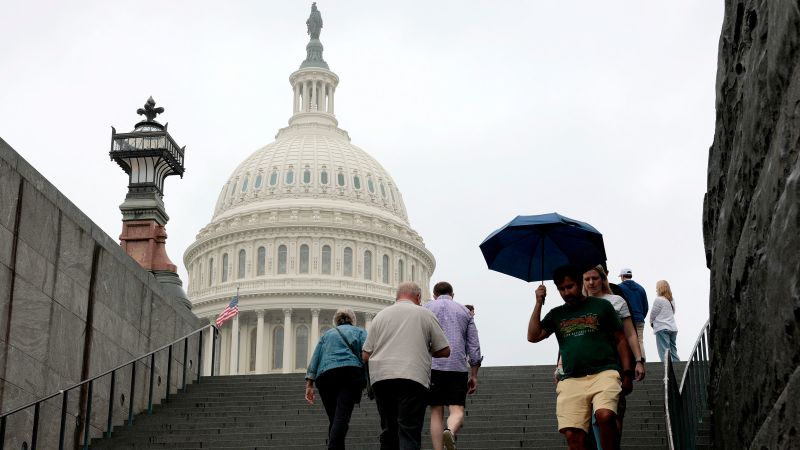The Senate Finance Committee, led by the Republican Party, recently put forth its suggestions concerning President Donald Trump’s legislative agenda. This proposed bill emphasizes extensive cuts to Medicaid, aiming to offset what they deem a multi-trillion-dollar tax increase on the American populace. The ambitious aims of this proposal underscore the GOP’s commitment to curtail government spending while seeking to provide tax relief to its constituents.
Within this proposal could be found many elements reminiscent of a piece of legislation narrowly passed by the House of Representatives the previous month. Key features include the permanence of individual income tax reductions established by the 2017 Tax Cuts and Jobs Act, which are slated to phase out at year’s end. In a historic move, the bill also introduces work requirements for Medicaid for the first time. Such a provision aims to encourage personal responsibility among beneficiaries while potentially impacting millions who currently rely on the program.
However, the Senate committee’s modifications to the package are notable and could spark considerable debate. Changes include the reduction of the cap on state and local tax deductions, steep reductions in Medicaid funding, and delays in the termination of certain clean energy tax incentives. The committee also plans to make multiple business tax breaks permanent and enhance the child tax credit. As the committee races against time to finalize the bill, they hope to push it through Congress and present it to President Trump before the Fourth of July holiday.
In the text released on Monday, a pivotal component is the proposed permanent retention of the $10,000 limit on state and local tax deductions (SALT). This decision could fracture an agreement reached by House Speaker Mike Johnson with GOP members from high-tax states to increase this limit to $40,000 for married couples earning under $500,000. The Senate’s decision to hold fast to the $10,000 cap may provoke tension, as it disregards substantial negotiations aimed at addressing tax burdens for residents in states with higher tax obligations.
Resentment among Senate Republicans regarding the House’s SALT cap agreement is palpable, primarily due to its perceived preferential treatment of taxpayers residing in predominantly Democratic states. Rep. Mike Lawler from New York, voicing the concerns of GOP lawmakers from high-tax regions, warned that alterations to this agreement would likely lead to the bill’s demise in the House. He insists on the integrity of the negotiated deal, asserting that any reduction in the SALT cap would compel him to oppose the bill, thus jeopardizing its overall passage.
Further amplifying concerns, Senate Finance Committee Republicans propose making several business tax breaks permanent. Initiatives such as immediate deductions for equipment costs and research and development expenditures are intended to facilitate economic growth while concurrently swelling the financial burden of the proposal. In contrast, the child tax credit would be enhanced to an unprecedented $2,200, diverging from the House’s increment to $2,500 set to take effect between 2025 and 2028.
The bill also introduces significant constraints on Medicaid providers, capping the provider tax most states currently impose at a reduced rate of 3.5% (down from 6%) by 2031. This regulation targets the 40 states and the District of Columbia that have opted to expand Medicaid services for low-income adults, leaving GOP-led states less affected.
Moreover, stipulations mandating that parents engage in specific work-related activities to qualify for Medicaid benefits could considerably increase the number of uninsured individuals. By instituting such requirements—compelling parents of older children to maintain a minimum monthly work schedule—projections by the Congressional Budget Office foretell a potential increase of 7.8 million uninsured Americans in 2034.
In the arena of environmental policy, the Senate’s legislative text seeks to eradicate tax credits for electric vehicles and implements a rapid phasing-out schedule for tax incentives on energy-efficient appliances. Notably, the Senate committee seeks an increase in the national debt ceiling by $5 trillion—a slightly more generous provision than the $4 trillion proposed by the House—offering the administration some leeway in implementing its fiscal agenda without necessitating negotiations with Democrats.
Congressional pressure mounts as the U.S. approaches its approximately $36 trillion debt ceiling, initially breached in January. Treasury Secretary Scott Bessent emphasizes the urgent need for bipartisan cooperation to adjust this ceiling, safeguarding the nation’s financial commitments and averting potential economic turmoil.
As the legislative agenda unfolds, tensions between competing interests within Congress will unavoidably surface, making the path ahead not only complex but also critical for the future fiscal landscape of the United States. The Senate Finance Committee’s proposals encapsulate a pivotal moment in both fiscal policy direction and party dynamics, reflecting the broader ideological divides that characterize contemporary American governance.



